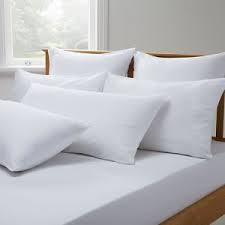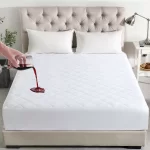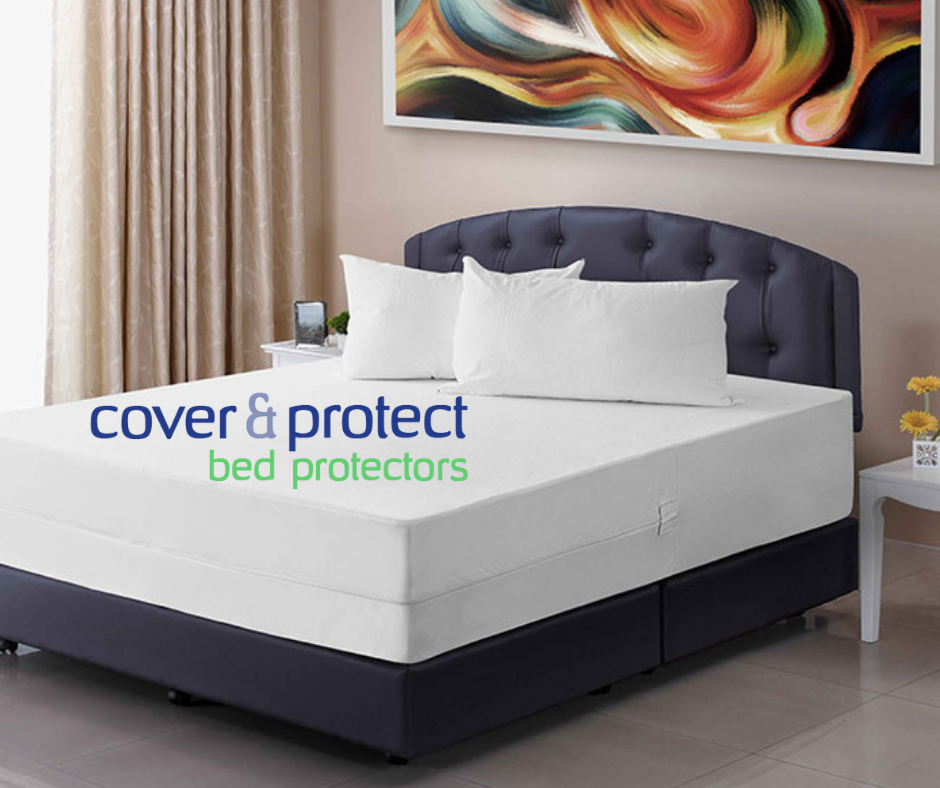
How to choose the correct mattress protector for your family.
When it comes to creating a comfortable and healthy sleeping environment for your family, choosing the right mattress protector is essential. Mattress protectors are an often-overlooked part of bedding but serve a crucial role in prolonging the life of your mattress and providing a cleaner, more comfortable sleep. Whether you’re looking to protect against spills, dust mites, allergens, or bed bugs, or simply improve the longevity of your mattress, choosing the correct mattress protector for your family can make all the difference. In this guide, we’ll explore the key factors to consider when selecting the perfect mattress protector.
What Is a Mattress Protector?
A mattress protector is a removable layer that fits over your mattress to shield it from various types of damage and external contaminants. The purpose of a mattress protector extends beyond simply guarding against spills; it can also prevent dust mites, allergens, bed bugs, and even incontinence issues from seeping into the mattress. This makes it a valuable asset for anyone looking to preserve their mattress for years while maintaining a healthier sleeping environment.
Why Do You Need a Mattress Protector?
Before diving into how to choose the right mattress protector, let’s explore why every bed in your home should have one:
Protection from Spills and Stains: Accidents happen, especially in homes with children or pets. A waterproof mattress protector can prevent liquids from seeping into your mattress, reducing the chance of stains and mold growth.
Allergen Prevention: Dust mites are a common allergen found in mattresses. A hypoallergenic mattress protector creates a barrier between your body and the mattress, preventing the accumulation of allergens.
Bed Bug Defense: A zippered mattress protector can act as a fortress against bed bugs, preventing them from infesting your mattress and ensuring you sleep peacefully. Click link for bed bug information.
Temperature Regulation: Some mattress protectors are designed to regulate temperature, providing comfort throughout all seasons.
Prolonging Mattress Life: A good quality mattress is a considerable investment. A mattress protector keeps your mattress looking new by shielding it from everyday wear and tear.
Click this link to our website for a range of mattress protectors
Types of Mattress Protectors
Mattress protectors come in different types, each with unique features and benefits. Understanding these types can help you select the one that meets your family’s specific needs.
1. Waterproof Mattress Protectors
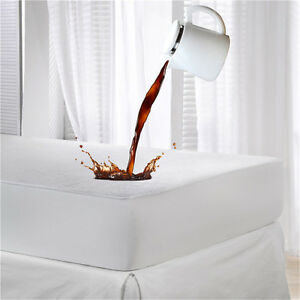
For families with young children, pets, or anyone prone to spills, a waterproof mattress protector is often the first choice. These protectors are designed with a waterproof membrane, usually made of vinyl, polyurethane, or TPU (thermoplastic polyurethane), which prevents liquid from reaching the mattress while allowing airflow.
- Pros:
- Excellent protection against spills and incontinence.
- Easy to clean.
- Affordable.
- Cons:
- Some can trap heat, leading to discomfort for hot sleepers.
- Vinyl protectors may make crinkling sounds.
2. Hypoallergenic Mattress Protectors
If someone in your household suffers from allergies or asthma, a hypoallergenic mattress protector can help minimize exposure to dust mites, pet dander, and pollen. These protectors are usually made from materials like cotton or bamboo, which are less likely to harbor allergens.
- Pros:
- Reduces allergen exposure.
- Soft and breathable.
- Cons:
- Not all hypoallergenic protectors are waterproof.
- Higher price points.
3. Cooling Mattress Protectors
For those who tend to overheat while sleeping, a cooling mattress protector can be a game-changer. These protectors are typically made from breathable materials like bamboo or moisture-wicking fabrics that help regulate body temperature and improve airflow.
- Pros:
- Ideal for hot sleepers.
- Improves overall comfort.
- Cons:
- May not offer waterproof protection.
- More expensive than standard mattress protectors.
4. Bed Bug Proof Mattress Protectors
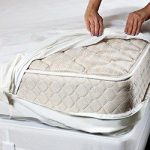
Bed bug infestations can be a nightmare, and preventing them is easier than eradicating them. Bed bug-proof mattress protectors are typically zippered, fully encasing the mattress to prevent bed bugs from entering or escaping. They are designed to be durable and tightly woven to block even the tiniest pests.
- Pros:
- Effective against bed bugs and dust mites.
- Long-lasting protection.
- Cons:
- More expensive than regular protectors.
- Can be less breathable
Click this link to our website for a range of Bed Bug mattress protectors
5. Organic Mattress Protectors
Families looking for eco-friendly and chemical-free options often choose organic mattress protectors. These are typically made from organic cotton, wool, or bamboo, which are grown and processed without pesticides or harmful chemicals.
- Pros:
- Free from chemicals and toxins.
- Suitable for sensitive skin and eco-conscious consumers.
- Cons:
- Typically not waterproof unless treated with natural water-resistant materials.
- Higher price point.
Key Features to Consider
When selecting the best mattress protector for your family, there are several important features to consider. Each family’s needs will vary, so it’s important to prioritize what’s most important for your household.
1. Material
The material of a mattress protector plays a significant role in comfort, durability, and functionality.
- Cotton: Soft, breathable, and natural. It’s an excellent option for those with sensitive skin.
- Polyester: Durable and inexpensive, but not as breathable as natural fabrics.
- Bamboo: Eco-friendly, moisture-wicking, and cooling. Bamboo mattress protectors are often chosen for hot climates or sleepers who tend to sweat.
- Wool: Naturally resistant to moisture and dust mites. Wool mattress protectors are ideal for those looking for a natural, chemical-free option.
- Vinyl or TPU: Provides waterproofing, but may trap heat and feel less comfortable to some users.
2. Breathability
A mattress protector should provide protection without compromising comfort. Breathability is a key factor for ensuring that the mattress protector doesn’t trap heat or moisture, which can lead to uncomfortable, sweaty nights.
- Cotton and bamboo are excellent choices for breathability.
- Polyester protectors may not offer the same airflow but can still be comfortable if paired with moisture-wicking properties.
3. Waterproofing
If you’re concerned about spills, bedwetting, or incontinence, a waterproof mattress protector is crucial. However, not all waterproof protectors are created equal. Look for protectors that use breathable materials such as polyurethane rather than vinyl, which can trap heat.
4. Hypoallergenic Properties
For families with allergy sufferers, choosing a mattress protector with hypoallergenic properties is key. Look for protectors that are made from materials that resist allergens and dust mites, such as cotton, bamboo, or wool. Ensure that the protector is also designed to be impermeable to dust mites by having a tightly woven fabric or complete encasement.
5. Ease of Cleaning
A mattress protector should be easy to remove and machine washable. Some protectors, especially waterproof ones, can only be wiped clean, which may not be ideal for families with children or pets. A machine-washable protector that withstands frequent washing without losing its protective properties is the best option for busy households.
6. Noise Level
Some waterproof mattress protectors, especially those made with vinyl, can be noisy and crinkly, which can disturb sleep. Look for quiet waterproof protectors made from materials like TPU, which are soft and silent while still providing excellent waterproofing.
7. Fit and Size
It’s important to choose a mattress protector that fits snugly on your mattress. Most protectors come in standard mattress sizes (Twin, Full, Queen, King), but be sure to measure the depth of your mattress. Some mattresses, particularly those with pillow tops, may require a deep-pocket mattress protector.
8. Durability
A mattress protector should be able to withstand regular use and washing without tearing or losing its protective properties. Look for protectors made from high-quality materials and read reviews to ensure you’re getting a product that lasts.
Choosing a Mattress Protector for Different Family Members
Different family members have different needs when it comes to mattress protection. Here’s how to choose the right protector based on specific needs:
1. For Children
Children are prone to accidents, spills, and bedwetting, making waterproof mattress protectors essential. Look for a protector that is:
- Waterproof.
- Machine washable.
- Durable enough to withstand frequent use and washing.
A protector with a quiet surface is also recommended to avoid disturbing their sleep with crinkling noises.
2. For Allergy Sufferers
If someone in your family has asthma, allergies, or eczema, choosing a hypoallergenic mattress protector can help improve their sleep quality. Prioritize:
- Allergen-proof materials.
- Tightly woven fabrics that keep dust mites and other allergens at bay.
- Breathable fabrics like cotton or bamboo.
3. For Hot Sleepers
For individuals who tend to sleep hot, a cooling mattress protector is ideal. Look for materials like:
- Bamboo or other moisture-wicking fabrics.
- Breathable protectors that allow for airflow.
- A protector with temperature-regulating properties to prevent overheating.
4. For Elderly Family Members
Elderly individuals may benefit from a protector that guards against incontinence while providing comfort. Look for:
- Waterproof protection.
- Soft and breathable materials to prevent skin irritation.
- Easy-to-remove and washable protectors.
5. For Pets
If your pets share the bed, you’ll want a protector that can handle pet dander, fur, and occasional accidents. Choose:
- A durable and waterproof protector.
- A protector that is easy to clean.
- Hypoallergenic protectors to reduce allergen buildup.
Conclusion
Choosing the right mattress protector for your family can have a significant impact on both the longevity of your mattress and the quality of sleep in your household. Whether you’re looking for a waterproof solution for your children, a hypoallergenic barrier for allergy sufferers, or a cooling protector for hot sleepers, there’s a mattress protector out there that meets your needs.
Keep in mind key factors like material, breathability, waterproofing, and ease of cleaning when making your decision. By investing in the right mattress protector, you’re not only protecting your mattress but also improving the comfort and health of your entire family.
This article provides a comprehensive overview of the importance of bedding protection for various health concerns, while also promoting the specific products offered by Cover and Protect. Please feel free to contact one of our friendly team members for any further information. ph: 02 931 66654.
Click this link to our website bedding protection sales & information


